Unit 3 Our Hobbies Topic 3 语法专项讲析 过去进行时态课件(共22张PPT) 仁爱科普版八年级英语上册
文档属性
| 名称 | Unit 3 Our Hobbies Topic 3 语法专项讲析 过去进行时态课件(共22张PPT) 仁爱科普版八年级英语上册 |

|
|
| 格式 | pptx | ||
| 文件大小 | 3.8MB | ||
| 资源类型 | 教案 | ||
| 版本资源 | 仁爱科普版 | ||
| 科目 | 英语 | ||
| 更新时间 | 2024-12-15 20:06:50 | ||
图片预览

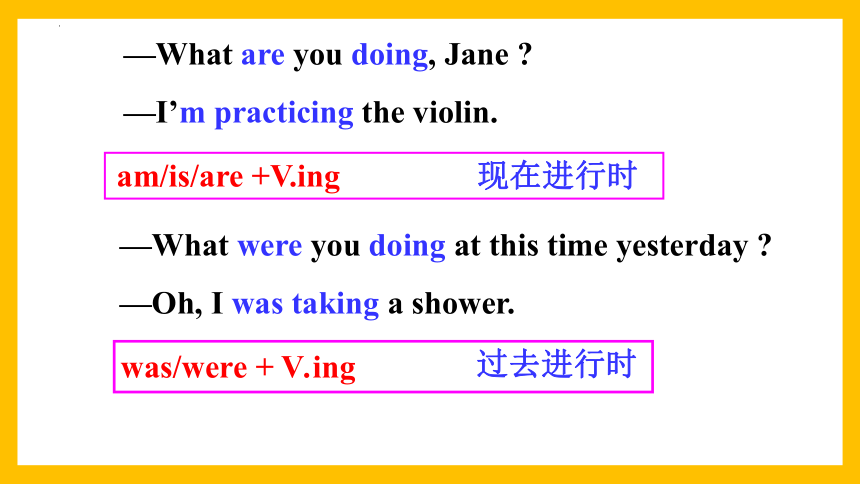
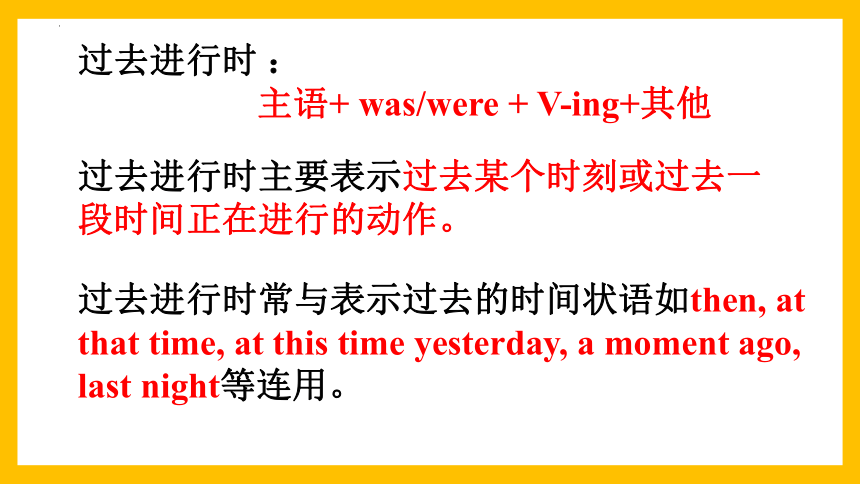
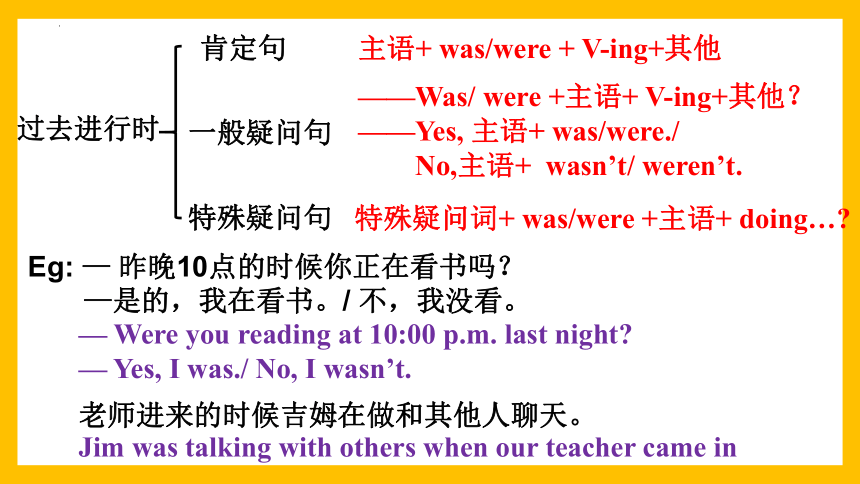
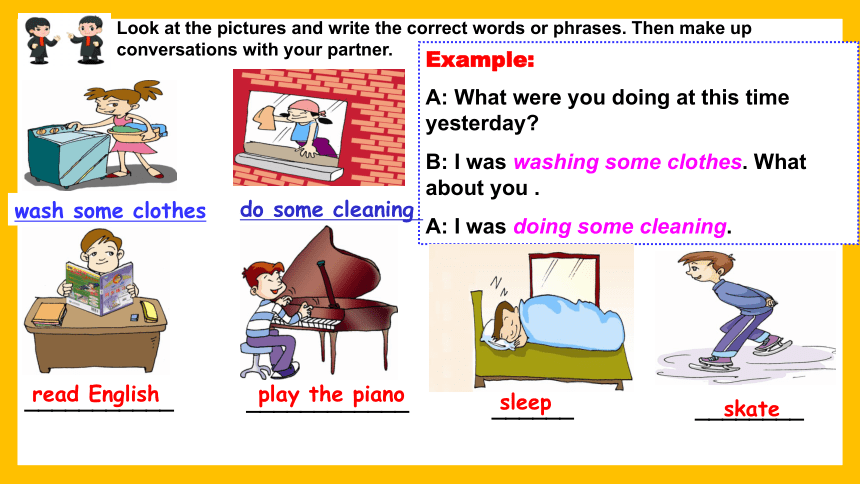
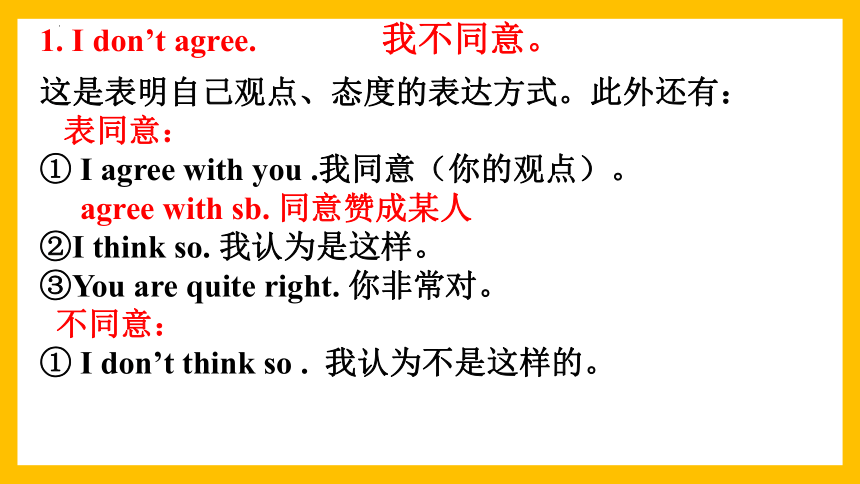
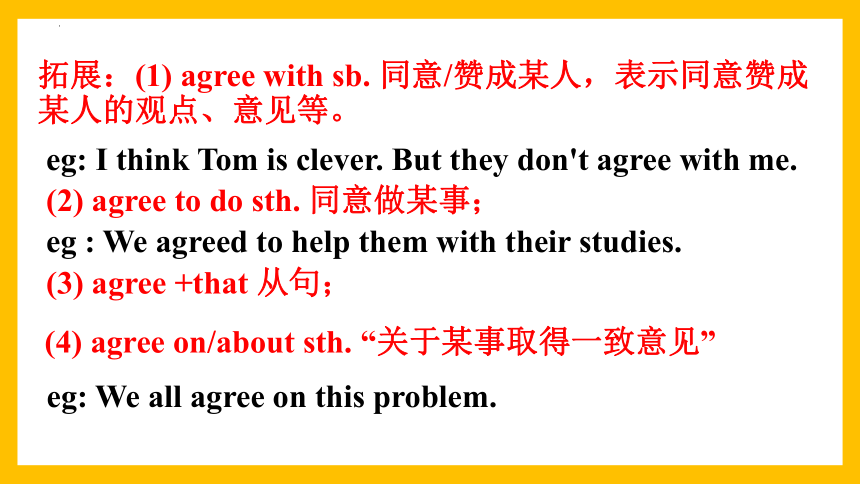
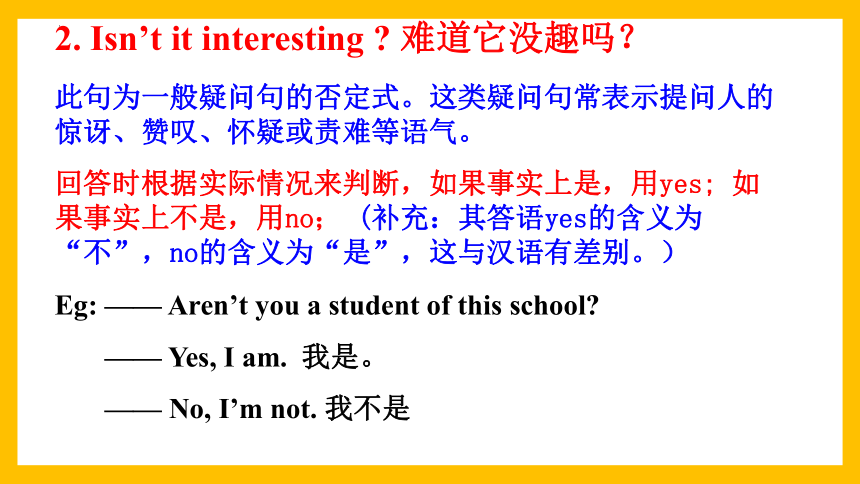
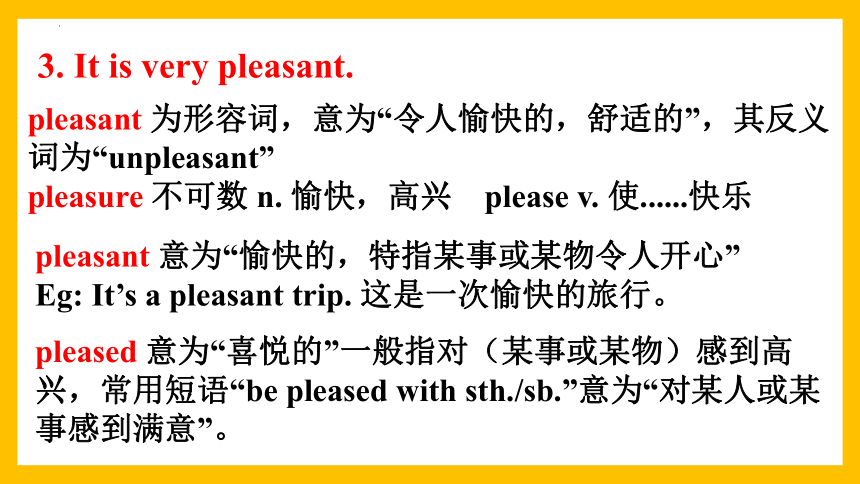
文档简介
(共22张PPT)
Unit 3 Our Hobbies
Topic 3
What were you doing at this time yesterday
—What are you doing, Jane
—I’m practicing the violin.
am/is/are +V.ing
现在进行时
—What were you doing at this time yesterday
—Oh, I was taking a shower.
was/were + V.ing
过去进行时
过去进行时 :
主语+ was/were + V-ing+其他
过去进行时主要表示过去某个时刻或过去一段时间正在进行的动作。
过去进行时常与表示过去的时间状语如then, at that time, at this time yesterday, a moment ago, last night等连用。
过去进行时
主语+ was/were + V-ing+其他
一般疑问句
——Was/ were +主语+ V-ing+其他?
——Yes, 主语+ was/were./
No,主语+ wasn’t/ weren’t.
肯定句
特殊疑问句
特殊疑问词+ was/were +主语+ doing…
Eg: — 昨晚10点的时候你正在看书吗?
—是的,我在看书。/ 不,我没看。
— Were you reading at 10:00 p.m. last night
— Yes, I was./ No, I wasn’t.
老师进来的时候吉姆在做和其他人聊天。
Jim was talking with others when our teacher came in
Look at the pictures and write the correct words or phrases. Then make up conversations with your partner.
Example:
A: What were you doing at this time yesterday
B: I was washing some clothes. What about you .
A: I was doing some cleaning.
wash some clothes
do some cleaning
read English
___________
play the piano
____________
sleep
______
skate
________
1. I don’t agree.
我不同意。
这是表明自己观点、态度的表达方式。此外还有:
表同意:
① I agree with you .我同意(你的观点)。
agree with sb. 同意赞成某人
②I think so. 我认为是这样。
③You are quite right. 你非常对。
不同意:
① I don’t think so . 我认为不是这样的。
拓展:(1) agree with sb. 同意/赞成某人,表示同意赞成某人的观点、意见等。
eg: I think Tom is clever. But they don't agree with me.
(2) agree to do sth. 同意做某事;
eg : We agreed to help them with their studies.
(3) agree +that 从句;
(4) agree on/about sth. “关于某事取得一致意见”
eg: We all agree on this problem.
2. Isn’t it interesting 难道它没趣吗?
此句为一般疑问句的否定式。这类疑问句常表示提问人的惊讶、赞叹、怀疑或责难等语气。
回答时根据实际情况来判断,如果事实上是,用yes; 如果事实上不是,用no; (补充:其答语yes的含义为“不”,no的含义为“是”,这与汉语有差别。)
Eg: —— Aren’t you a student of this school
—— Yes, I am. 我是。
—— No, I’m not. 我不是
3. It is very pleasant.
pleasant 为形容词,意为“令人愉快的,舒适的”,其反义词为“unpleasant”
pleasure 不可数 n. 愉快,高兴 please v. 使......快乐
pleasant 意为“愉快的,特指某事或某物令人开心”
Eg: It’s a pleasant trip. 这是一次愉快的旅行。
pleased 意为“喜悦的”一般指对(某事或某物)感到高兴,常用短语“be pleased with sth./sb.”意为“对某人或某事感到满意”。
4. It was snowy and dark on the last evening of the year. 除夕夜,阴暗的天空下着雪。
on the last evening of the year 除夕夜
在具体某一天的上年,下午和晚上,前面有形容词修饰时用介词on。
Eg. 在一个雨夜,怀特一家人正在一家餐馆吃晚饭。
On a raining evening, the Whites were having linner at a restaurant.
5. No one heard her when they were passing by.
人们从她旁边经过时,没人听到她喊什么。
在英语中,当两个动作在过去某时间同时发生时,通常动作持续时间较长的动词用过去进行时;而另一动词则用一般过去时
Eg. 昨天晚上我正在吃饭的时候,有人敲门。
When I was having supper yesterday evening, someone knocked at the door.
拓展:
①hear sb. 听见某人说话
②hear of 听说;得知
Eg: 我从未听说过这些事。
I have never heard of such things.
③hear from 收到......的来信
Eg: 昨天我收到了我笔友的来信。
I heard from my pen pal yesterday.
④hear sb. doing/do sth. 听见某人正在做某事/做某事。
Eg: I heard her singing a song when I passed by her room.
I often hear a girl sing in the next room.
Look at the pictures and fill in the blanks with the correct forms of the key words.
knock at / take a shower
P76 2
1. When the cat knocked at the door the mouse _____________________ .
was taking a shower
come out / sleep
2. The mouse was hungry. When he
__________ of the bathroom to look
for food, the cat ______________ .
came out
was sleeping
wake up / carry
When the cat woke up, the
mouse ______________ his cake.
was carrying
enjoy / chat
The mouse and the cat
_______________ happily while they were enjoying the moon.
were chatting
6. But the little girl was afraid to go home without selling one box of matches,because her father would beat her.
但小女孩不敢一盒火柴也没卖就回家,因为她父亲会打她的。
be afraid to do sth. 害怕(而不敢)做某事
Eg. 她害怕晚上独自外出。
She is afraid to go out alone at night.
be afraid of doing sth. 担心做某事
Eg. 我担心考试中会出错。
I'm afraid of making mistakes in the exam.
7. She lit three matches. ... Then she lit a fourth match. 然后她又点燃了第四根火柴。
a/an +序数词,不强调顺序,表示“又一,再一” = another
Eg. 你再来杯茶吗?(已去过两次了)
Would you like a second cup of tea
8. And then they feel too tired to work on Manday mornings
too…to… 太…以致不能…
(1)too...to可以与so...that进行转换。too后边接形容词或副词, to后接动词原形。so接形容词, that后接从句。
Eg. Lucy太小,还不能去上学。
Lucy is so young that she can't go to school.
=Lucy is too young to go to school.
(2) too...to可以与not...enough to互换。
Eg. lucy is too young to go to school
=Lucy is not old enough to go to school.
过去进行时
别挂断,请稍等
接电话
在昨天这个时候
--难道它没趣吗?
--我不觉得有趣。
6. 同意赞成某人
7. 同意做某事
--Isn’t it interesting
--No, I don’t think so.
agree with...
agree to do sth.
hold the line/hold on, please
answer the telephone
at this time yesterday
8. 除夕夜
9. 害怕(而不敢)做某事
10. 担心做某事
11. 又一,再一
12. 太…以致不能…
13. 听说
14. 收到......的来信
15. 听到某人正在做某事
16. 敲门/出来/醒来
on the last evening of the year
be afraid to do sth.
be afraid of doing sth.
a/an +序数词
too…to…
hear of
hear from
hear sb. doing sth.
knock at the door
come out/wake up
Thank you
Unit 3 Our Hobbies
Topic 3
What were you doing at this time yesterday
—What are you doing, Jane
—I’m practicing the violin.
am/is/are +V.ing
现在进行时
—What were you doing at this time yesterday
—Oh, I was taking a shower.
was/were + V.ing
过去进行时
过去进行时 :
主语+ was/were + V-ing+其他
过去进行时主要表示过去某个时刻或过去一段时间正在进行的动作。
过去进行时常与表示过去的时间状语如then, at that time, at this time yesterday, a moment ago, last night等连用。
过去进行时
主语+ was/were + V-ing+其他
一般疑问句
——Was/ were +主语+ V-ing+其他?
——Yes, 主语+ was/were./
No,主语+ wasn’t/ weren’t.
肯定句
特殊疑问句
特殊疑问词+ was/were +主语+ doing…
Eg: — 昨晚10点的时候你正在看书吗?
—是的,我在看书。/ 不,我没看。
— Were you reading at 10:00 p.m. last night
— Yes, I was./ No, I wasn’t.
老师进来的时候吉姆在做和其他人聊天。
Jim was talking with others when our teacher came in
Look at the pictures and write the correct words or phrases. Then make up conversations with your partner.
Example:
A: What were you doing at this time yesterday
B: I was washing some clothes. What about you .
A: I was doing some cleaning.
wash some clothes
do some cleaning
read English
___________
play the piano
____________
sleep
______
skate
________
1. I don’t agree.
我不同意。
这是表明自己观点、态度的表达方式。此外还有:
表同意:
① I agree with you .我同意(你的观点)。
agree with sb. 同意赞成某人
②I think so. 我认为是这样。
③You are quite right. 你非常对。
不同意:
① I don’t think so . 我认为不是这样的。
拓展:(1) agree with sb. 同意/赞成某人,表示同意赞成某人的观点、意见等。
eg: I think Tom is clever. But they don't agree with me.
(2) agree to do sth. 同意做某事;
eg : We agreed to help them with their studies.
(3) agree +that 从句;
(4) agree on/about sth. “关于某事取得一致意见”
eg: We all agree on this problem.
2. Isn’t it interesting 难道它没趣吗?
此句为一般疑问句的否定式。这类疑问句常表示提问人的惊讶、赞叹、怀疑或责难等语气。
回答时根据实际情况来判断,如果事实上是,用yes; 如果事实上不是,用no; (补充:其答语yes的含义为“不”,no的含义为“是”,这与汉语有差别。)
Eg: —— Aren’t you a student of this school
—— Yes, I am. 我是。
—— No, I’m not. 我不是
3. It is very pleasant.
pleasant 为形容词,意为“令人愉快的,舒适的”,其反义词为“unpleasant”
pleasure 不可数 n. 愉快,高兴 please v. 使......快乐
pleasant 意为“愉快的,特指某事或某物令人开心”
Eg: It’s a pleasant trip. 这是一次愉快的旅行。
pleased 意为“喜悦的”一般指对(某事或某物)感到高兴,常用短语“be pleased with sth./sb.”意为“对某人或某事感到满意”。
4. It was snowy and dark on the last evening of the year. 除夕夜,阴暗的天空下着雪。
on the last evening of the year 除夕夜
在具体某一天的上年,下午和晚上,前面有形容词修饰时用介词on。
Eg. 在一个雨夜,怀特一家人正在一家餐馆吃晚饭。
On a raining evening, the Whites were having linner at a restaurant.
5. No one heard her when they were passing by.
人们从她旁边经过时,没人听到她喊什么。
在英语中,当两个动作在过去某时间同时发生时,通常动作持续时间较长的动词用过去进行时;而另一动词则用一般过去时
Eg. 昨天晚上我正在吃饭的时候,有人敲门。
When I was having supper yesterday evening, someone knocked at the door.
拓展:
①hear sb. 听见某人说话
②hear of 听说;得知
Eg: 我从未听说过这些事。
I have never heard of such things.
③hear from 收到......的来信
Eg: 昨天我收到了我笔友的来信。
I heard from my pen pal yesterday.
④hear sb. doing/do sth. 听见某人正在做某事/做某事。
Eg: I heard her singing a song when I passed by her room.
I often hear a girl sing in the next room.
Look at the pictures and fill in the blanks with the correct forms of the key words.
knock at / take a shower
P76 2
1. When the cat knocked at the door the mouse _____________________ .
was taking a shower
come out / sleep
2. The mouse was hungry. When he
__________ of the bathroom to look
for food, the cat ______________ .
came out
was sleeping
wake up / carry
When the cat woke up, the
mouse ______________ his cake.
was carrying
enjoy / chat
The mouse and the cat
_______________ happily while they were enjoying the moon.
were chatting
6. But the little girl was afraid to go home without selling one box of matches,because her father would beat her.
但小女孩不敢一盒火柴也没卖就回家,因为她父亲会打她的。
be afraid to do sth. 害怕(而不敢)做某事
Eg. 她害怕晚上独自外出。
She is afraid to go out alone at night.
be afraid of doing sth. 担心做某事
Eg. 我担心考试中会出错。
I'm afraid of making mistakes in the exam.
7. She lit three matches. ... Then she lit a fourth match. 然后她又点燃了第四根火柴。
a/an +序数词,不强调顺序,表示“又一,再一” = another
Eg. 你再来杯茶吗?(已去过两次了)
Would you like a second cup of tea
8. And then they feel too tired to work on Manday mornings
too…to… 太…以致不能…
(1)too...to可以与so...that进行转换。too后边接形容词或副词, to后接动词原形。so接形容词, that后接从句。
Eg. Lucy太小,还不能去上学。
Lucy is so young that she can't go to school.
=Lucy is too young to go to school.
(2) too...to可以与not...enough to互换。
Eg. lucy is too young to go to school
=Lucy is not old enough to go to school.
过去进行时
别挂断,请稍等
接电话
在昨天这个时候
--难道它没趣吗?
--我不觉得有趣。
6. 同意赞成某人
7. 同意做某事
--Isn’t it interesting
--No, I don’t think so.
agree with...
agree to do sth.
hold the line/hold on, please
answer the telephone
at this time yesterday
8. 除夕夜
9. 害怕(而不敢)做某事
10. 担心做某事
11. 又一,再一
12. 太…以致不能…
13. 听说
14. 收到......的来信
15. 听到某人正在做某事
16. 敲门/出来/醒来
on the last evening of the year
be afraid to do sth.
be afraid of doing sth.
a/an +序数词
too…to…
hear of
hear from
hear sb. doing sth.
knock at the door
come out/wake up
Thank you
同课章节目录
- Unit 1 Playing Sports
- Topic 1 I'm going to play basketball.
- Topic 2 I'll kick you the ball again.
- Topic 3 The school sports meet is coming.
- Unit 2 Keeping Healthy
- Topic 1 You should brush your teeth twice a day.
- Topic 2 I must ask him to give up smoking.
- Topic 3 Must we exercise to prevent the flu?
- Unit 3 Our Hobbies
- Topic 1 What's your hobby?
- Topic 2 What sweet music!
- Topic 3 What were you doing at this time yesterday
- Unit 4 Our World
- Topic 1 What's the strongest animal on the farm?
- Topic 2 How can we protect ourselves from the eart
- Topic 3 The Internet makes the world smaller.
